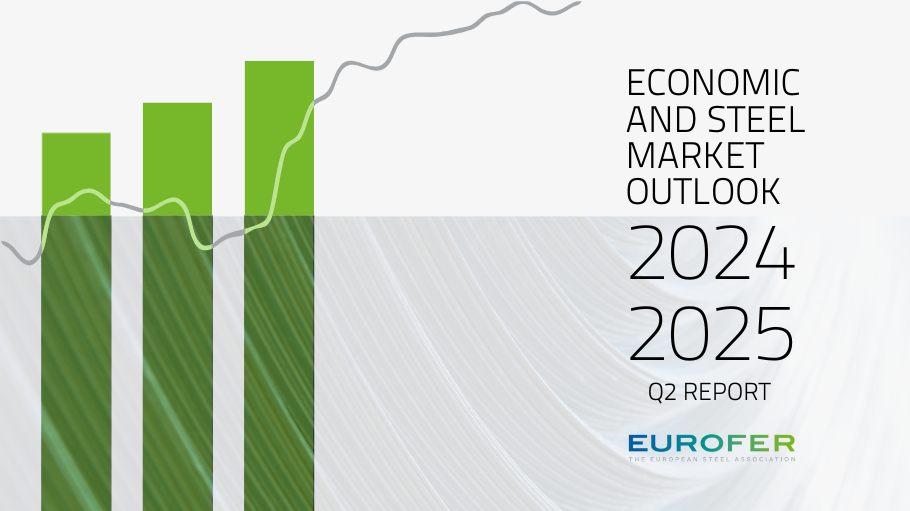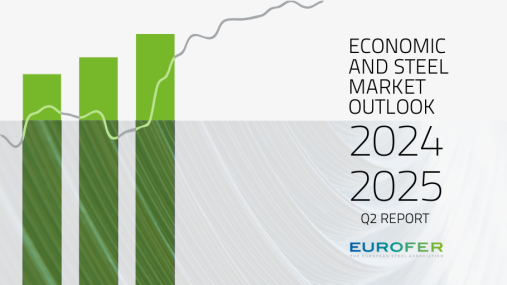
Press releases » Negative trends in steel market continue to deepen, weakening recovery in 2024 and 2025
Negative trends in steel market continue to deepen, weakening recovery in 2024 and 2025
Downloads and links
Recent updates

Brussels, 25 July 2024 – Major indicators in the European steel market show a steeper-than-expected downward trend, further impacting the outlook for this year and the next. Poor demand conditions, driven by ongoing factors such as high energy prices, persistent inflation, economic uncertainty and geopolitical tensions, are exacerbated by a manufacturing crisis affecting the largest steel-using sectors, including construction and automotive. According to EUROFER’s latest Economic and Steel Market Outlook, apparent steel consumption is further deteriorating. After a slump (-3.1%) in the first quarter of 2024, its rebound for the full year has been revised downwards (to +1.4% from +3.2%), as well as for 2025 (+4.1% from +5.6%). Similarly, output in steel-using sectors, after a decline in the first quarter (-1.9%), is projected to experience a deeper-than-expected recession (-1.6% from -1%). A recovery is anticipated only in 2025 (+2.3%). Steel imports continue to show historically high shares (27%).
“The situation requires urgent action at EU level, as both European steel production and related clean tech value chains are at risk. As Commission President von der Leyen said, ‘the future of our prosperity must be made in Europe’. Steel has underpinned European prosperity since the European Community’s inception. We look forward to working with the Commission President to deliver a European Clean Industry Deal with a Steel Pact at its core. Europe is stronger with European-made steel”, said Axel Eggert, Director General of the European Steel Association (EUROFER), following the publication of the Economic Report Q3 2024.
In the first quarter of 2024, apparent steel consumption significantly decreased (-3.1%), reaching a total volume of 31.9 million tonnes. Moderate quarterly improvements are expected throughout 2024, yet volumes will remain below pre-pandemic levels. The overall evolution of steel demand remains highly uncertain. Apparent steel consumption is projected to recover at a slower pace than previously estimated, both in 2024 (+1.4%) and 2025 (+4.1%).
Similarly, domestic deliveries markedly contracted (-5.8%) in the first quarter of the year, after a moderate increase (+1.3%) in the preceding quarter. Imports continued increasing (+12%), while their share out of apparent consumption remained stable at a historically high level (27%) also in the first quarter of 2024.
In the same period, also steel-using sectors’ output decreased (-1.9%), despite stronger-than-expected resilience until the end of 2023 (+0.5% in the last quarter and +1.2% overall for 2023). These developments resulted from a continued downturn in the construction, mechanical engineering, domestic appliances and metalware sectors. Automotive output also entered negative territory (-0.9%), a trend expected to continue throughout 2024, resulting in a deeper recession than previously estimated (-3% from -0.4%).
Steel-using sectors’ output is projected to see a steeper-than-expected decline in 2024 (-1.6% from -1%), primarily due to the second consecutive recession forecasted for the construction sector (which accounts for the largest share of steel consumption in the EU, 35%), persistent geopolitical tensions, and the lagged impact of high interest rates on manufacturing. Growth is expected to rebound gradually (+2.3%) in 2025.
Contact
Lucia Sali, Spokesperson and Head of Communications, +32 2 738 79 35, (l.sali@eurofer.eu)
About the European Steel Association (EUROFER)
EUROFER AISBL is located in Brussels and was founded in 1976. It represents the entirety of steel production in the European Union. EUROFER members are steel companies and national steel federations throughout the EU. The major steel companies and national steel federation of Turkey, Ukraine and the United Kingdom are associate members.
The European Steel Association is recorded in the EU transparency register: 93038071152-83.
About the European steel industry
The European steel industry is a world leader in innovation and environmental sustainability. It has a turnover of around €191 billion and directly employs around 303,000 highly-skilled people, producing on average 140 million tonnes of steel per year. More than 500 steel production sites across 22 EU Member States provide direct and indirect employment to millions more European citizens. Closely integrated with Europe’s manufacturing and construction industries, steel is the backbone for development, growth and employment in Europe.
Steel is the most versatile industrial material in the world. The thousands of different grades and types of steel developed by the industry make the modern world possible. Steel is 100% recyclable and therefore is a fundamental part of the circular economy. As a basic engineering material, steel is also an essential factor in the development and deployment of innovative, CO2-mitigating technologies, improving resource efficiency and fostering sustainable development in Europe.

Download files or visit links related to this content
Strasbourg, 17 December 2025 – The European Commission’s latest proposals on the Carbon Border Adjustment Mechanism (CBAM), unveiled today, correctly identify several loopholes that risk undermining its effectiveness, notably regarding EU exports, downstream sectors and circumvention practices. However, despite these laudable efforts, the measures put forward fail to deliver a comprehensive and durable response to carbon and jobs leakage, warns the European Steel Association (EUROFER).
A milestone occasion to quickly and effectively restore affordable electricity, to relaunch the
decarbonization and strengthen the international competitiveness of the European steel
industry.
Brussels, 02 December 2025 – Unchanged negative conditions – U.S. tariffs and trade disruptions, economic and geopolitical tensions, protracted weak demand and still high energy prices – continue to weigh on the European steel market. EUROFER’s latest Economic and Steel Market Outlook confirms for 2025 another recession in both apparent steel consumption (-0.2%, unchanged) and steel-using sectors (-0.5%, revised from -0.7%). A potential recovery is expected only in 2026 for the Steel Weighted Industrial Production index (SWIP) (+1.8%, stable) and for apparent steel consumption (+3%, slightly revised from +3.1%) – although consumption volumes would still remain well below pre-pandemic levels. Steel imports retained historically high shares (27%), while exports plummeted (-9%) in the first eight months of 2025.